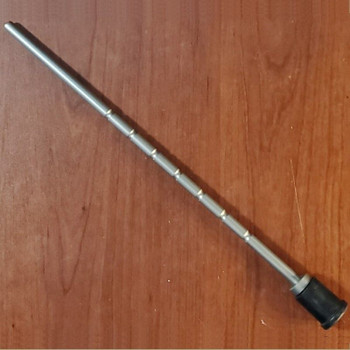Glasser
Braided Carbon Fiber Replacement Endpin Assembly for Upright Bass
We ship worldwide! (Read this)
- Small Accessory:
- This item ships FREE (USA) in a cart totaling $100 or more
Description
Why make an endpin of carbon fiber? CF has a high strength-to-weight ratio, while having a much lower density than steel. So this high-quality endpin assembly has the strength and rigidity of a standard steel endpin, which is usually much heavier. The full length of the pin is 18.5 inches, and the screw on rubber ball foot adds 1 inch to its height capability. The pin itself is 10mm, and it has a screw-on rubber ball cap to protect floors from the pointy end (which can be used in the traditional way - when permitted - to "stake into" a stage floor to couple with the floor.)
The unique tightening mechanism gives it incredible holding power and stability. The receiver assembly is a light and very strong composite material, while the shaft is made of carbon fiber. The assembly also has a channel for your tailgut (tailpiece cable) to guide through. Professional installation is strongly recommended.
The "plug" portion measures 30.4mm (1.2") at the wide end, tapering to 28.8mm (1.13"). It will need to be installed into a hole that closely matches that taper.
IMPORTANT NOTE: The thumbscrew assembly in this device exerts pressure around the endpin shaft, rather than against it. It is not recommended to use the carbon fiber shaft with your existing endpin receiver (instead of installing the one that comes with the shaft); the simple thumbscrew assembly common to most endpin receivers will likely pierce the fibers and split them, which, with regular use, will damage the shaft in short order.
Installation Considerations
Almost all* bass makers use an endpin like this one - one that has a tapered collar that needs to be custom-fitted into the opening in your bass' endblock – so you’re likely going to have to use a specialized reamer tool (and a good deal of detailed and patient woodworking) to re-fit the hole to match the shape of the endpin collar.
While I regularly encourage the "DIY ethic," I usually recommend just getting this done by a competent luthier – this is one of those situations where it usually is cheaper (and more efficient) to have a luthier do it. They’ve got the experience to do it well and quickly without drama; and more financially important, they already own and have the necessary tools on hand in their workshop. While it will probably cost a couple hundred dollars to have the endpin installed by a pro, you'll pay much more than that for just the special tapered reamer that’s pretty much integral to doing the job.
So, unless you plan on doing several basses, investing in that tool – and the know-how to do the job – might cost more than it’s worth.
*(A notable exception is Kay/Engelhardt, who usually did a very unusual endpin arrangement, using a 3/4" straight hole for their plain, unfinished solid steel endpin mechanisms with the big 1/2" post.)






